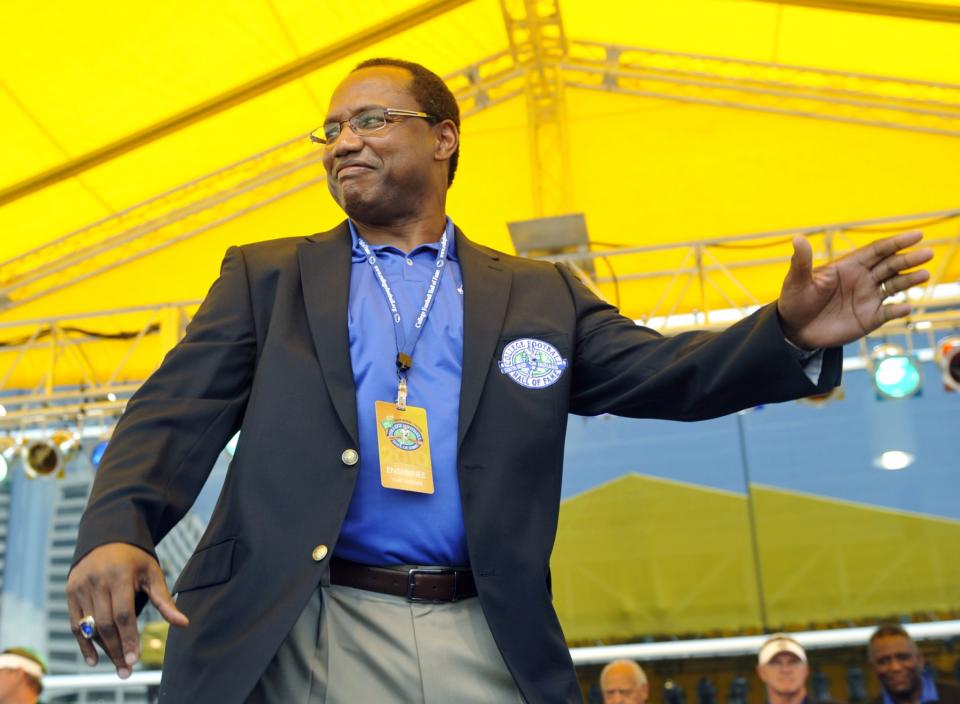Hear ex-Seahawk Curt Warner's gripping story about life with autistic twins
Former Seattle Seahawks running back Curt Warner once was regarded for his toughness in coming back from a knee injury, the likes of which many backs of his era failed to recover from.
But it’s clear that his and his wife’s greatest strength has come in raising their children. The parents of autistic twins boys, the Warners’ challenge has been almost unimaginable, as detailed in this gripping, moving feature in the The News Tribune of Tacoma.

Think you have it bad? Read about their story. You realize how much of a challenge daily life is, raising two self-destructive children — now each 22 years old — who profiled on the lower end of the spectrum. But then listen to the words of Warner and his wife, Ana, and you realize how they have learned to embrace the challenge of fighting the good fight against an occasionally crippling disorder for their children.
“People ask, ‘How do you do it?’ ” Curt said. “Well, you just do it. You can’t just wait for a miracle, you have to get busy finding a way to live, one day after the other. And at some point you realize that maybe that was the miracle itself.”
The Warners had dropped from the public spotlight the past several years as they tried to find solutions for their problems. But now they’re coming out to tell their story in a book they’ve written, “Waiting for a Miracle,” which is being shopped to publishers. They’re hoping to provide any solace or inspiration for any parents experiencing the same challenges they are in raising autistic children — and in their case, two boys the same age experiencing the same difficulties.
“We’ve got a better sense of peace about it now,” Ana said. “We still worry, but we can talk about it now, and for so long, even that was painful.”
“It’s been a jagged road we’ve traveled,” Curt added. “But here we are.”
How jagged? The boys suffered through bouts of sometimes uncontrollable, unforeseen rage. They’d kick holes in walls. Bang their heads against tables. Throw fits in public places, often where Warner — the third-leading rusher in Seahawks history — would be recognized. The boys, Austin and Christian, would punch and bite each other. Nine years ago, Austin found matches and nearly burned the family house down.
This all after Ana had experienced a stillborn baby and three miscarriages. She also had delivered the couple’s first child less than a year before the twins were born. The Warners define toughness, and their story is incredible to hear about.
Naturally, as the twins’ problems, still undiagnosed until they were 5, worsened Curt and Ana blamed themselves. They wondered what they could have done better or differently. They met with teams of doctors and specialists but wondered if they had done enough. They had, and there was only so much they felt they had the power to control in the children’s lives.
Their solution? Provide as much love and support for their kids, no matter the situation, when trouble arose. It was the only method they knew, and it was the tried and true solution they’ve fallen back on all these years.
One time the family took a trip to try some new therapy methods to help the twins, Christian threw a fit in the middle of Denver’s crowded airport and a large crowd gathered as he started screaming and banging his head on the floor. That’s when Curt’s greatest strength emerged in Ana’s eyes.
“Curt got down on the floor, laid right beside Christian, talked to him quietly, trying to reassure him that things would be all right,” he said.
Their story needs to be heard. This book needs to be picked up by a publisher. Autism is the fastest-growing neurological disorder in the country, per the story, with one in every 68 children landing somewhere on the spectrum (and one in 42 among boys). There might not be a cure, per se, but recognizing the signs in autistic children early on can help in terms of therapy and mitigating symptoms.
The Warners bravely are telling their very personal story with the hope it leads to increased awareness and greater funding for autism research — and, one day they hope, leading to a cure. It’s a story you ought to read.
– – – – – – –
Eric Edholm is a writer for Shutdown Corner on Yahoo Sports. Have a tip? Email him at edholm@yahoo-inc.com or follow him on Twitter!


